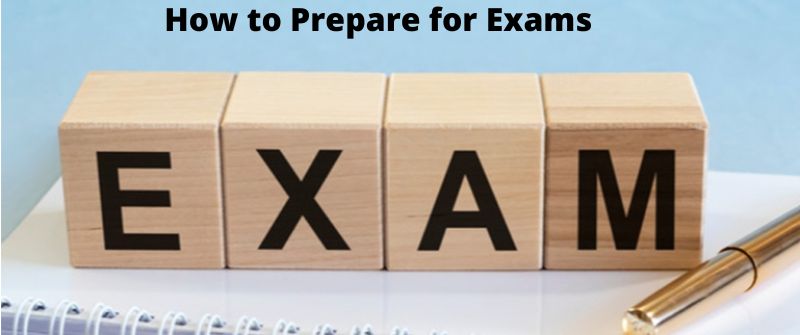Studying to prepare for an exams is no easy task, whether in a short time or not. The knowledge and skills needed to get an A grade at university are not easy to acquire, which is why you must use effective strategies.
Whether you are revising for an upcoming test or trying to decide what books and resources you should use for studying, this post has your back on tips and hacks to prepare for exams.
Practical Strategies and Tips to Prepare for an Exam
Discover practical quick and effective strategies to prepare for exams within a short time. Learn tips for efficient studying, time management, and maximizing your study sessions for rapid exam success.
1. Start Early

The earlier you start studying, the better. The earlier you start preparing, the better job of studying you will do.
When we say “early” here, we mean as early as possible to start your studies. For example, if you know the exam is scheduled for January 16th, start studying now!
2. Preparation
You should always be prepared for an exam by knowing all materials and topics beforehand (that way, there are no surprises).
This can be done by reading articles/books about your subject or a related subject so that everything is fresh in your mind and things like formulas and definitions are easy to find when needed.
3. Study smart
The best way to prepare for an exam is to study smart and not hard. You’ll be more likely to remember key information when you can understand it and retain it in a useful way.
So rather than spending hours studying a chapter or even a whole book, try studying the main points of each chapter, then review the material again later.
Or spend time reading summaries of other people’s notes instead of trying to remember everything they’ve said from memory.
4. Make your notes accessible
When you’re studying on your own, it can be easy to forget what you’ve read or hear something that isn’t quite right.
Therefore, make sure that anyone who helps you with your preparation has access to all your notes and resources – they should be able to follow along without having to go back through them all again themselves.
If you are working in groups and have private study sessions, ensure everyone has copies of their notes. Hence, everyone gets credit for contributing something new rather than just repeating what someone else has said before them!
5. Manage time
The most important thing you can do is manage your time. You will have to set aside a certain amount of time each day or week to study, and if you try to cram all your studying into one long session, it can be overwhelming.
It is a good idea to spread your studying out over several days or weeks so that it doesn’t feel like too much at once. Use the following tips:
- Know your goals and set a plan.
- Have a daily routine that includes exercise, healthy eating, and relaxation to help you stay focused.
- Make sure all your schoolwork is finished ahead of time.
6. Create study routines
Create study routines that work for you, your schedule, and your lifestyle. If studying is a struggle, try breaking up the studying into several sessions throughout the day. For example, set aside 15 minutes after breakfast or lunch.
Suppose you have one hour between classes; set aside 30 minutes at night before bedtime.
If your schedule allows only 20 minutes of studying in the evening, set aside 10 minutes just before bedtime and then take another 10-minute break before getting up.
7. Complete Homework on Time

Do not procrastinate! If you wait until the last minute, there is no way to get everything done by the deadline.
You cannot prepare for exams in a short time without missing out on valuable study items that would otherwise be on the exam.
They include researching answers, practicing test questions, writing practice essays, or other test preparation materials.
8. Use flashcards
One way to manage your time is by using flash cards. When you use flashcards, you don’t have to study the material.
In essence, you just have to memorize it by looking at the pictures and writing down keywords and phrases in response to them.
This helps keep your mind fresh and active during long studying periods without feeling like you are learning anything new from what you’re doing!
9. Take a break every hour
While you may not want to stop studying, taking a break every hour can help keep your mind fresh and alert. Many students find their best ideas come when they’re on the go.
10. Keep a timer handy
Use a timer on your phone or another device to track how long you’ve worked on a problem each day. This will help you stay on task and avoid procrastination.
Set goals, then set the timer for how long you have left to reach them. Setting a goal is important, but it won’t do much good if you don’t ensure you reach it.
A good way to do this is by setting a timer for how long you have left until the goal is reached — then work toward finishing it in that time frame. If you don’t finish within the allotted time, set another goal and start again!
11. Get organized
Another step to preparing for an exam is to get organized. You need to make sure that you are prepared for the exam. This avoids failing your final exam and the challenges ahead.
This can be done by doing a lot of research on the exam and its objective. The more information you have on it, the better your chances of passing the exam are.
Search online for as much information about the exam as possible and take notes from it so that you don’t forget anything important during the test.
Also, ensure you have everything you need when taking the exam so there are no delays in getting started. Feel free to check more tips to passing exams with minimal studying and get more insights.
12. Watch Online Videos
Online videos are perfect for this kind of thing because they allow you to watch expert teachers explain things at length and in detail — without having to listen carefully or read their words aloud — while also quizzing them on what they’ve said, asking questions of their own.
You can use these videos as a starting point to build your study routine, but don’t expect them to work miracles independently.
If you want help with the material, go back through the text and try solving questions yourself rather than just watching someone else do it for you.
13. Revise with books
Make sure you have the necessary materials. You don’t have to buy all new textbooks, but you need to have them handy if you want to take notes during class.

If you are taking notes on paper, make sure your notebook is well organized and has enough space to avoid losing any important information.
If you are taking notes electronically, then make sure you have access to the Internet at home or school so that you can check your email and access your social networking accounts during class time.
This will allow you to be more prepared for questions that might come up in class and will also give you a chance to look up information online before an exam if necessary.
14. Use past papers
When studying for a previous paper, you must use many examples and practice answering questions in different ways to answer them correctly when you take the exam.
This will help with your confidence levels and ensure that you are not nervous or worried about doing well on the test day.
15. Know the topic
Know the topic outline, study guides, and other materials your instructor or school provides. Make sure you understand them fully before you start studying.
If you have any questions about the material, ask them before taking the test. You may find that your instructor has additional information or resources he or she would be willing to share with you.
